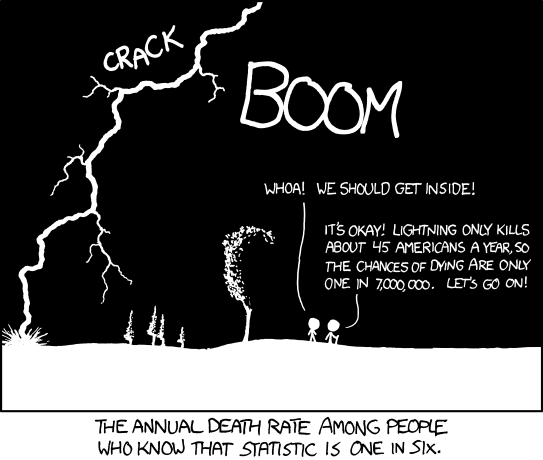Difference between revisions of "795: Conditional Risk"
m (clean up, typos fixed: existant → existent) |
m (Category edit) |
||
| (13 intermediate revisions by 12 users not shown) | |||
| Line 8: | Line 8: | ||
==Explanation== | ==Explanation== | ||
| − | The comic deals with the difference between general probability of certain event based on | + | The comic deals with the difference between the general probability of a certain event based on history and the probability of the same event in particular circumstances. The chance of any American selected randomly from the general population to be killed by lightning is very low, but part of the reason for this is that an average American would seek shelter and safety when caught in a lightning storm. The joke is that someone armed with this particular statistical knowledge would not take the normal precautions and therefore leave themselves far more vulnerable. |
| − | The "one in six" statistic is probably invented by the author - which | + | In the title text, since the statistic provided talks only about Americans, the other character wrongly assumes that lightning strikes ''only'' happen to Americans, rather than the data for lightning strikes for other nationalities being simply not included in the discussion. Because of this, as a non-American, he believes his chance of being struck by lightning is nonexistent - which underlines the difference between knowing a certain event can't or didn't happen and not having any data about the event. |
| + | |||
| + | The "one in six" statistic is probably invented by the author - which also illuminates the danger of dealing with "statistical data" provided by random sources without any attribution to actual statistical surveys or hard data. And of course, now all xkcd readers know the statistic, likely bringing down the death rate. | ||
==Transcript== | ==Transcript== | ||
| Line 19: | Line 21: | ||
:Second person: It's okay! Lightning only kills about 45 Americans a year, so the chances of dying are only one in 7,000,000. Let's go on! | :Second person: It's okay! Lightning only kills about 45 Americans a year, so the chances of dying are only one in 7,000,000. Let's go on! | ||
| + | :[Caption below the panel:] | ||
:The annual death rate among people who know that statistic is one in six. | :The annual death rate among people who know that statistic is one in six. | ||
{{comic discussion}} | {{comic discussion}} | ||
[[Category:Comics featuring Cueball]] | [[Category:Comics featuring Cueball]] | ||
| + | [[Category:Comics with inverted brightness]] | ||
[[Category:Statistics]] | [[Category:Statistics]] | ||
| + | [[Category:Multiple Cueballs]] | ||
Revision as of 21:06, 11 November 2019
| Conditional Risk |
 Title text: 'Dude, wait -- I'm not American! So my risk is basically zero!' |
Explanation
The comic deals with the difference between the general probability of a certain event based on history and the probability of the same event in particular circumstances. The chance of any American selected randomly from the general population to be killed by lightning is very low, but part of the reason for this is that an average American would seek shelter and safety when caught in a lightning storm. The joke is that someone armed with this particular statistical knowledge would not take the normal precautions and therefore leave themselves far more vulnerable.
In the title text, since the statistic provided talks only about Americans, the other character wrongly assumes that lightning strikes only happen to Americans, rather than the data for lightning strikes for other nationalities being simply not included in the discussion. Because of this, as a non-American, he believes his chance of being struck by lightning is nonexistent - which underlines the difference between knowing a certain event can't or didn't happen and not having any data about the event.
The "one in six" statistic is probably invented by the author - which also illuminates the danger of dealing with "statistical data" provided by random sources without any attribution to actual statistical surveys or hard data. And of course, now all xkcd readers know the statistic, likely bringing down the death rate.
Transcript
- [Lightning strikes the ground, illuminating trees with a bright white light. Two people are standing near it. One has a walking stick.]
- CRACK
- BOOM
- First person: Whoa! We should get inside!
- Second person: It's okay! Lightning only kills about 45 Americans a year, so the chances of dying are only one in 7,000,000. Let's go on!
- [Caption below the panel:]
- The annual death rate among people who know that statistic is one in six.
Discussion
"I'm not American! So my risk is basically zero!"
Is the risk to Americans so low because lightning concentrates on non-Americans?
I used Google News BEFORE it was clickbait (talk) 15:42, 26 January 2015 (UTC)
The line 'The annual death rate among people who know that statistic is one in six' clearly points out that the people who know the statistic tend to be dismissive about the danger of the lightning strikes and put themselves in danger. Even though the statistic is probably invented by the author, shouldn't it go in the explanation?
I did not want to change the explanation without a discussion. (PS: I am a newbie here)
A2658742 (talk) 10:44, 10 April 2015 (UTC)a2658742
I'd like to point out that the "invented one in six statistic" is a roll of the dice. 162.158.90.161 (talk) (please sign your comments with ~~~~)
1 in 6 is also the probability of shooting yourself in (classic) russian roulette. Siv3nIvy (talk) 11:41, 8 September 2016 (UTC)
This comic has been cited to illustrate the confusion of base vs conditional probability in Steven Pinker's new book [“Rationality: What It Is, Why It Seems Scarce, Why It Matters.”] --Agovita (talk) 11:17, 19 October 2021 (UTC)
